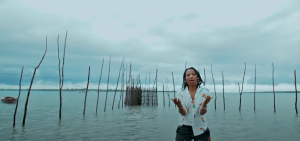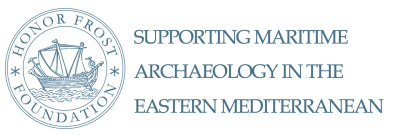The Climate Change Threat To Our Maritime Heritage
Dive & Dig Blog by Lauren Tidbury

Listening to episode five, I think this is my favourite! Our aim was to try to finish the series with a reflection on where maritime archaeology as a discipline is, where it is going, what challenges were faced in the past and what challenges we face today. In this episode we find out about some truly extraordinary and inspiring projects, so this is definitely worth a listen!
At the very start we hear a clip from Honor Frost on anchors, she was talking about the challenges of ancient seafarers and the importance of the anchor. If you don’t know, Honor was also known as the ‘Lady of Anchors’ and really pioneered anchorology, see the links below to find out more.
Lucy began by interviewing Philip Beale, someone who understands first hand what challenges were faced by ancient seafarers. Philip and his team built a replica Phoenician galley and circumnavigated the African continent! Herodotus mentions a voyage from around 600BC where the Phoenicians circumnavigated Africa, so Philip wanted to see if this was actually possible. Just over two years and 20,000 nautical miles later, they had done it! This remarkable project helped them to better understand ancient seafaring and realise how intrepid the Phoenician sailors were.
Lucy then spoke to Helen Farr, as although they were clearly skilled seafarers the Phoenicians were not the first to cross vast distances of ocean. Helen introduced us to some really early evidence of seafaring and provided a truly deep time perspective. This includes the movement of people to Australia where they navigated distances of 70km by at least 65,000 years ago!!
But with all this knowledge of our maritime past we wanted to explore what else we have to learn and what presents the greatest challenge to our knowledge expansion. In the previous episode we saw how climate change presented a very real threat to our ancestors with sites now fully submerged beneath the waves or under coastal sediment. So what is the impact of climate and coastal change on our fragile maritime heritage today, and how do we deal with this? Lucy spoke to a series of people to better understand this.
She started by talking again to Philippe Cousteau. Philippe, inspired by his grandfather, has been working in marine conservation. He highlighted the relationship between natural and cultural heritage, and the link between the destruction of both. He discusses how we need to understand our past to learn for the future. Lucy went on to emphasise how important understanding our past is, for example how understanding past climate change can help us to model for the future.
This led Lucy to talk about the MarEA project (Maritime Endangered Archaeology in the Middle East and North Africa) and we invited Crystal el Safadi to the podcast to tell us more. She explained how the project has been documenting the impact of change, both natural and anthropogenic on marine cultural heritage. She talks to us about how they are using remote sensing techniques and satellite imagery to detect and monitor changes to maritime cultural heritage sites in the MENA region.
The United Nations have also been addressing ocean challenges through the United Nations Decade of Ocean Science for Sustainable Development. Jon Henderson is part of the Ocean Decade Heritage Network. He describes how the Decade is a framework of stakeholders working to improve the health of the oceans and puts it pretty bluntly by explaining that ‘without healthy oceans we will all be dead’! Jon is also working on a project called Rising from the Depths which is part of the Global Challenges Research Fund. Rising from the Depths aims to use maritime cultural heritage as a vehicle to improve people’s lives and help coastal communities in Kenya, Tanzania, Mozambique and Madagascar, East Africa.
One specific project that is part of the Risings project is being conducted by Dr Ichumbaki from the University of Dar es Salam, Tanzania, in collaboration with the Universities of Exeter and Southampton. This project very much takes a community based, bottom up, co-creation approach with the aim of developing more sustainable approaches to the management of maritime cultural heritage, and exploring how this can also help reflect on maritime practice both past and present. The research focuses on the ancient coastal settlement and modern day fishing and trading port of Bagamoyo. Ichu and his student Claudia tell us more about the project. Claudia is also famous in Tanzania as a rap artist AKA Chemical – the song you hear on the podcast is one she and Ichu co-wrote and Chemical performed. It is named after the project ‘Bahari Yetu, Urithi Wetu’ ‘Our Ocean, Our Heritage’. Claudia has been using popular music to help promote and protect cultural heritage and is inspiring people.
Leading on from this we look at other ways to engage and inspire, particularly the younger generation, with maritime heritage. Lucy talks to Nada Nofal, director of the Maritime Archaeology Outreach Project in Egypt, also known as Bahar. In the background we can hear 30 children participating in one of her workshops which are aimed at 5-12 year olds to raise awareness and engage people in their maritime cultural heritage.
Rounding up this final episode and the podcast, we return to Timmy Gambin. His Phoenician Shipwreck Project has featured across the podcast as an example of how the discipline has changed, what advances in technology have meant, and also how we can explore the wider Phoenician world. He talks more about the need to inspire the next generation, and has undertaken some exceptional outreach and engagement work as part of his project. Lucy and Bettany wrap up by talking about the many challenges faced by heritage today. Key to this is not just documenting it but building capacity, educating and getting local communities on board. We must engage across the board to bring in different perspectives in order to achieve a sustainable future.
We have really enjoyed making this podcast, we have all learnt a lot! We were extremely privileged to be able to talk to such a wide range of experts, who are so passionate about what they do. Yet we have only touched the tip of the iceberg. And no I’m not referring to the Titanic and Bob Ballard’s stories from Episode Two! But the huge variety of sites investigated and approaches adopted by maritime archaeologists, from shipwrecks to submerged worlds, from diving to forensic analysis. This really is a remarkable discipline, with so much left to explore and many challenges to face along the way!
Thank you to Lucy Blue and Cathy Giangrande, I think we made a great team! And thank you to Mark Rickards, David Prest and Amy Irvine for helping us to produce this podcast. Finally thank you to Honor Frost, for providing us with some extraordinary stories, sites and a wonderful legacy.
To listen click here https://audioboom.com/dashboard/5052122
LINKS
Explore more about Honor’s work on anchors here
Find out more about the incredible journey undertaken by Philip Beale to build and sail a Phoenician galley here
Dr R. Helen Farr is an Associate Professor in Archaeology at the University of Southampton – find out more about her work on early seafaring here
Find out more about the work of Philippe Cousteau and his charity Earth Echo International here
Dr Crystal el Safadi is a Senior Research Fellow in Archaeology at the University of Southampton, find out more about the MarEA project here
Dr Jon Henderson is a maritime archaeologist at the University of Edinburgh, find out about his Rising from the Depths project here. You can also find out about the Ocean Decade Heritage Network here and I would recommend reading Jon’s paper ‘Oceans without History’ here.
More information on the Bagamoyo project led by Dr Icumbaki is available here and you can watch and listen to Chemical’s song about their work here
Read more about the Bahar project in Egypt, led by Nada Nofal, here
To continue to explore the Phoenician Shipwreck Project being undertaken by Timmy Gambin and his team check out the project website here
